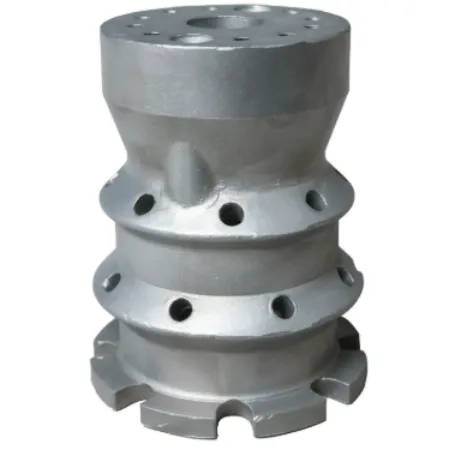Handy, Mobiltelefon:+86-311-808-126-83
Email:info@ydcastings.com
How Metal Castings Drive Modern Manufacturing Efficiency
From industrial machinery to automotive parts and consumer electronics, Metallgussteile play a vital role in the global manufacturing ecosystem. Among them, aluminium metal casting and aluminum die casting have emerged as key technologies that combine strength, precision, and lightweight performance. As demand for intricate, cost-effective components grows across sectors, businesses are turning to modern casting solutions to meet performance and scalability requirements.
Versatility and Strength of Modern Metal Castings
Metallgussteile are foundational to modern manufacturing because they allow complex shapes to be produced with high repeatability and minimal machining. Castings can be made from a wide variety of metals, including steel, iron, zinc, and aluminum, depending on the application's strength, weight, and corrosion resistance needs.
Today’s Metallgussteile are not just raw structural elements—they’re engineered components optimized for performance. Innovations in mold design, alloy composition, and solidification control have improved part accuracy, reduced porosity, and enabled integration of functional features like cooling channels or attachment points directly into the cast.
The Rise of Aluminium Metal Casting in Lightweight Engineering
The growing focus on sustainability and fuel efficiency, particularly in the automotive and aerospace sectors, has positioned aluminium metal casting as a leading solution. Aluminum offers a unique combination of strength-to-weight ratio, corrosion resistance, and thermal conductivity, making it ideal for producing engine parts, transmission housings, and structural components.
Aluminium metal casting processes such as sand casting, permanent mold casting, and die casting enable flexibility in part design and production volume. Sand casting is favored for low-volume, complex shapes, while permanent mold and die casting provide higher consistency for mass production.
Furthermore, the recyclability of aluminum supports eco-friendly production goals, aligning with environmental regulations and circular economy strategies adopted by modern manufacturers.
What Makes an Efficient Aluminum Casting Die
Der aluminum casting die is the heart of the die casting process. A well-engineered die ensures repeatable precision, optimal metal flow, and minimal thermal stress across production cycles. Typically made from tool steel and treated for high thermal resistance, these dies are designed to handle the rapid injection and solidification of molten aluminum.
In high-volume production, die life and cycle speed become critical. A premium aluminum casting die must be able to maintain dimensional tolerances through thousands of shots, resist erosion from molten aluminum, and manage heat dissipation to avoid warping or premature wear.
Recent advancements include multi-slide die systems that allow for the formation of undercuts and internal geometries without secondary machining, thus reducing production time and cost.
Advancing Productivity with Aluminum Die Casting Technology
Aluminum die casting remains one of the fastest and most reliable methods for producing complex aluminum parts with tight tolerances. It involves forcing molten aluminum into a hardened steel mold under high pressure, creating parts with excellent surface finish, mechanical integrity, and dimensional accuracy.
This process supports rapid production cycles, making aluminum die casting ideal for high-volume sectors such as automotive, HVAC systems, and appliance manufacturing. It also allows for the inclusion of thin walls and fine details, which are difficult or expensive to achieve through machining.
With modern CNC machining and real-time quality control, die-cast aluminum parts can now rival forged components in strength while being far lighter, significantly improving efficiency in applications where weight matters.
Customizing Metal Castings for Industry-Specific Demands
Different industries impose different performance requirements on Metallgussteile. Automotive manufacturers may demand high fatigue resistance; medical device makers require biocompatible alloys; while electronics manufacturers prioritize thermal dissipation and size constraints.
Through alloy selection, casting method customization, and post-processing treatments like heat treatment or surface coating, Metallgussteile can be engineered to deliver performance tailored to their end-use environments.
Collaborative design between OEMs and casting suppliers also shortens development timelines and improves manufacturability, especially when 3D modeling and simulation are used to optimize flow, cooling, and solidification before physical tooling is produced.
Metal Castings FAQs
What are Metallgussteile and why are they widely used?
Metallgussteile are components formed by pouring molten metal into a mold, used for their ability to form complex shapes with precision and durability in industrial applications.
How is aluminium metal casting different from steel casting?
Aluminium metal casting offers lighter weight, better corrosion resistance, and thermal conductivity, making it preferable for automotive and aerospace parts compared to heavier steel castings.
What is the function of an aluminum casting die?
Ein aluminum casting die shapes molten aluminum into precise forms during die casting, ensuring dimensional accuracy and repeatability in mass production.
Why is aluminum die casting ideal for automotive manufacturing?
Aluminum die casting enables fast, high-volume production of lightweight yet strong parts like engine housings and brackets, reducing vehicle weight and improving fuel efficiency.
Can Metallgussteile be customized for specific industries?
Yes, Metallgussteile can be tailored by adjusting alloys, casting processes, and post-treatment techniques to meet the unique mechanical and thermal needs of various industries.

-
Materials Used in Manufacturing Cap End Pipe FittingsNachrichtNov.24,2025
-
Material Properties of CF8M CastingNachrichtNov.24,2025
-
How to Inspect Pump Cap Ends for DamageNachrichtNov.21,2025
-
Backward Curved Impeller – Efficient Airflow Solutions for Industry | YD CastingsNachrichtNov.21,2025
-
Automobile Water Pump - Efficient, Quiet, Durable & ElectricNachrichtNov.21,2025
-
Impeller for Pumps – High-Efficiency, Durable, OEM-ReadyNachrichtNov.21,2025











